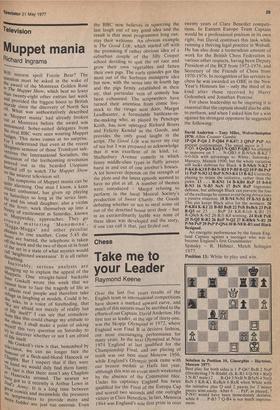isaa■ T elevision
Muppet mania
Richard Ingrams
Wiii success spoil Fozzie Bear? The question must be asked in the wake of the award of the Montreux Golden Rose ° The Muppet Show, which beat no fewer and twenty-eight other entries last week 'nd provided the biggest boost to British Morale since the discovery of North Sea What was authoritatively described as 'Muppet mania' had already broken eat at Montreux before the award was 42inounced. Sober-suited delegates from k`ae rival BBC were seen wearing Muppet `Odges. This news comes as no surprise. ,',Or understand that even at the recent ,acer ,.e seminar of those Trotskyist subversives the International Socialists, the discussion
}petered of the forthcoming revolution
as the bearded Utopians hurried off to watch The Muppet Show O n the nearest television set.
sYmptoms of Muppet mania can be
'quite alarming. One man I know, a keen cricket enthusiast, has given up playing saturdays so long as the series lasts. efe and his small daughter, also a victim frenzy the fever, work themselves up into a a:114k.y of excitement as Saturday, known ci a,. wiaPPetday, approaches. They go ,Atind muttering `Monomona phrugga-Mugga' and other peculiar d -ases to one another. Come 5.45 the errks are barred, the telephone is taken of t,''e hook and the two of them sit in front cartne set in a state of what mystics would distiu'rhbeiinggh.tened awareness'. It is all rather I n ni
y
s ievta.
serious analysts are
Mi!.nIs ginig up to explain the appeal of the ! JaLppets. One straight-faced hackette Gaskell wrote this week that we .‘innot bear to face the tragedy of life as faefaffects real people and therefore take sh uge in laughing at models. Could it be,
asks, in a voice of foreboding, that
Of e,. are afraid not merely of reality but :ife itself?' I can see that considera dluhs like this could change my attitude to rne show. I shall make a point of asking elf tr,.Ys this very question on Saturday to 0?` ,to discover whether or not I am afraid life itself.
Gaskell's view is that, benumbed by :vision, we can no longer face the chrhonr of a flesh-and-blood Hancock or en hand But I suspect that if they were and we would duly find them funny. he fact is that there aren't any Chaplins hay rlancocks around. The nearest we bve, got to it recently is Arthur Lowe in a s rmy, A io•eat e0 • It is a long time between en rnics and meanwhile the pressures rn_" scriptwriters to provide more and re fodder are just too onerous. Even the BBC now believes in squeezing the last laugh out of any good idea and the result is that most programmes long outstay their welcome. An obvious example is The Good Life, which started off with the promising if rather obvious idea of a suburban couple of the Jilly Cooper school deciding to quit the rat race and grow their own vegetables and fatten their own pigs. The early episodes got the most out of the Surbiton menagerie idea but now, with the series into its fourth lap and the pigs firmly established in their sty, that particular vein of comedy has been exhausted. The scriptwriters have turned their attention from comic livestock to the virago next door, Margot Leadbeatter, a formidable battleaxe-inthe-making who, as played by Penelope Keith, has_ now upstaged Richard Briers and Felicity Kendal as the Goods, and provides the only good laughs in the script. The Good Life was never my cup of tea but I was prepared to acknowledge that it was excellent of its kind, i.e. Shaftesbury Avenue comedy in which funny middle-class types in fluffy jerseys burst in and out of one another's houses. A lot however depends on the strength of the plots and the latest episode seemed to have no plot at all. A number of themes were introduced — Margot refusing to perform in the local Musical Society's production of Sweet Charity, the Goods debating whether or not to steal some oil out of the deserted house next door — but in an extraordinarily, feeble way none of these ideas was developed and the story, if one can call it that, just fizzled out.


































 Previous page
Previous page